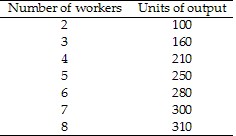What are the obstacles to achieving an efficient allocation of resources in the market economy?
What will be an ideal response?
Markets with price or quantity regulations, taxes or subsidies, externalities, public goods or common resources, monopoly power, or high transactions costs will not produce the efficient quantity of a good or service. In each of these situations, the market prices charged or quantities produced and sold will not result in the efficient allocation of resources. Efficiency requires that the marginal social benefit of the last unit produced be equal to the marginal social cost. The equilibrium at the intersection of the demand and supply curves in the competitive market creates this result. When the market price or quantity is pulled away from the market equilibrium, the marginal social benefit of the last unit produced does not equal its marginal social cost.
You might also like to view...
Which of the following cases is an OCA that is NOT preferred by a home country?
A) The home country faces symmetric shocks with the other country. B) The labor market is well integrated, allowing for migration. C) The home country faces asymmetric shocks with the other country. D) The home economy is well integrated with the other country, carrying out vast amounts of trade.

 Refer to Table 10.1. If the price of output is $2 per unit and we observe the firm hiring six workers, if the firm is maximizing profit, the wage rate must be between ________ and ________.
Refer to Table 10.1. If the price of output is $2 per unit and we observe the firm hiring six workers, if the firm is maximizing profit, the wage rate must be between ________ and ________.
A. $20; $40 B. $30; $50 C. $40; $60 D. $500; $600